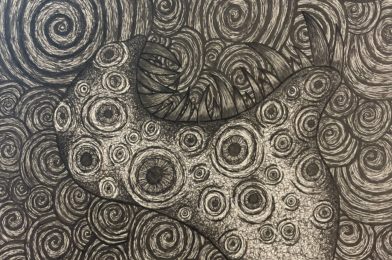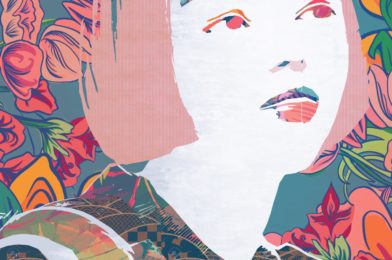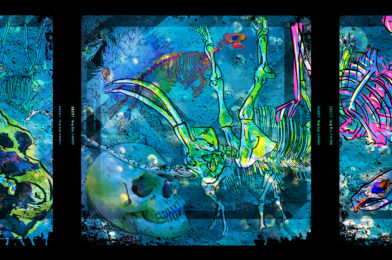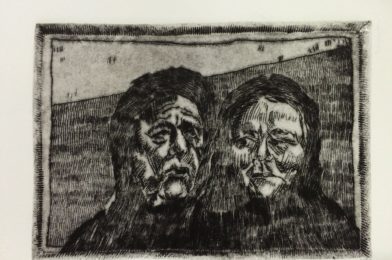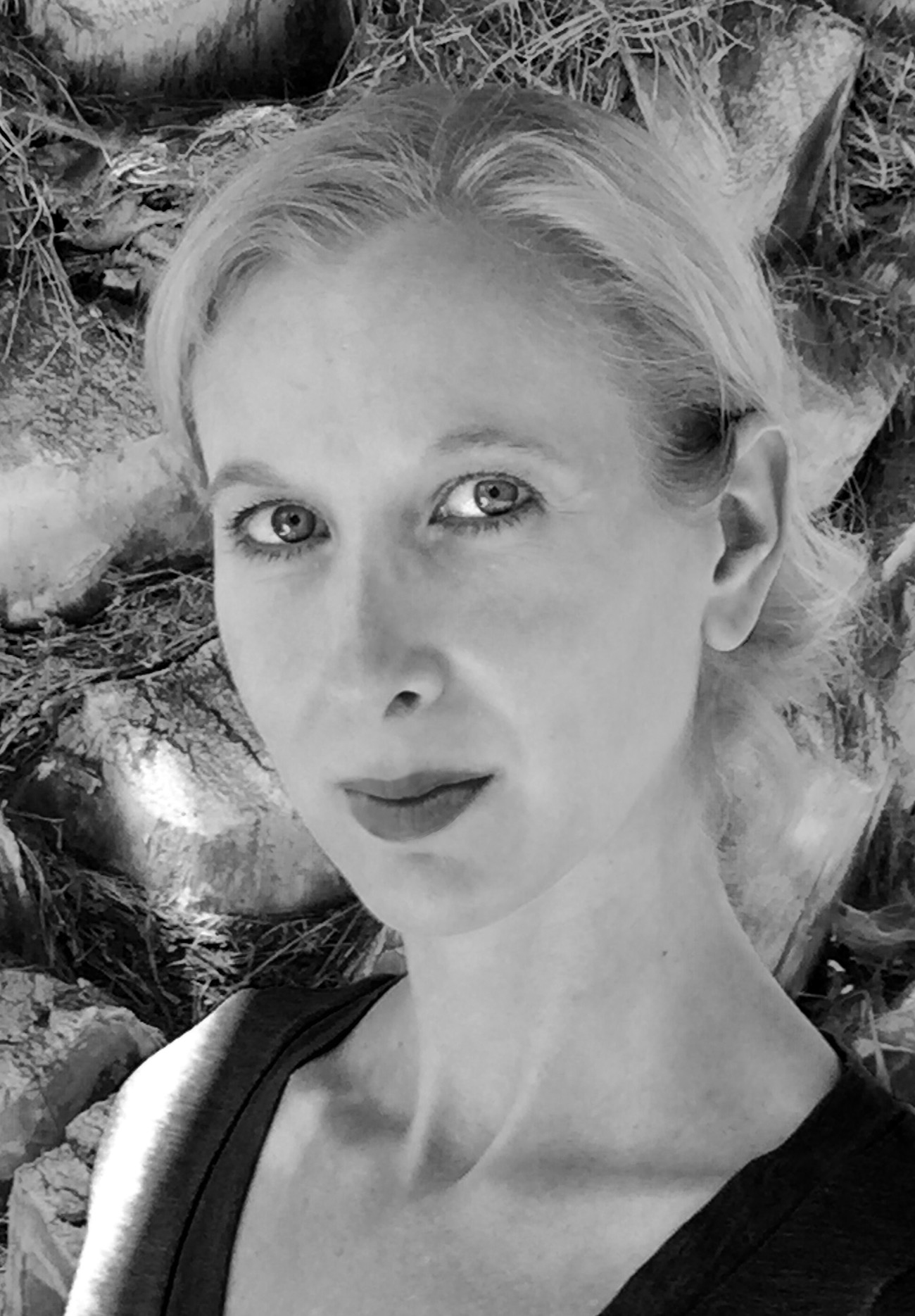Christopher DeWan is author of HOOPTY TIME MACHINES: fairy tales for grown ups, a collection of domestic fabulism from Atticus Books. He has published more than fifty stories in journals including Bodega, Gravel, Hobart, Passages North, and wigleaf, and has been nominated twice for the Pushcart Prize. In 2017, he was named as one of the ISA’s “Top 25” screenwriters and recipient of a fellowship from the Middlebury Script Lab.
Chris started with the history of his relationship to literature, and how it grew into his life as a writer.
My mom was an English teacher and when she wanted to celebrate something, she would take us to a bookstore as a special treat. At the end of the school year, we would celebrate by binge-buying a bunch of books.
In terms of a “writing career” I think of that term as an oxymoron. Leaving school environments and going into adult environments and figuring out what role I wanted writing to play in my life changed a lot. I worked for ad agencies for a while, then I was a blogger. I had a decently well known blog. Writing came up in a lot of different ways so that even when I wasn’t writing, I thought of myself as a writer. I worked in theater for a long time, partly as a playwright but I ran a couple theaters for a couple of years. It wasn’t always writing, but it was always stories.
His debut collection of these stories, Hoopty Time Machines, opens with an epigraph: “In olden times, when wishing still helped…” It’s a pregnant introduction; the ellipses are ominous, suggesting that what’s to come is a world where the hopefulness of the old world still holds some magical play. But these tales aren’t sweetly magical or thinly veiled moral lessons. Goldilocks navigates the modern dating world while juggling jobs, a husband watches his wife have an affair with Poseidon after they meet on a kayaking trip, the last man on Earth blogs about solitude. What follows the epigraph is over forty stories, or “fairy tales for grown ups,” as the subtitle calls them.
The stories that repeat in our daily lives become personal mythologies. DeWan identifies these myths and presents them to us, sometimes as revitalized classics; those legends and fairy tales we’ve heard since children.
The stories in [Hoopty Time Machines], I wrote over the span of four or five years, and I wrote other stories that weren’t a part of that book. But for the book I wanted stories that were already familiar to us, whether it was a myth or a fairy tale, but something we all knew so we could look for other ways to see it, hold it up, and show something a little different.
In that book, a lot of stories go back to Greek mythology. The label “fairy tale” came later when I was talking to the editor of the book. I was like, Oh yea haha these are like fairy tales for grown ups, and he was like, I can market that! We’ll make millions!
A lot of what glued those stories together was that it had a lot to do with the hopes and aspirations we have. It was a lot of American dreamy fairy tales, the fact that we all buy into the idea that our futures will be a certain way, and then we go down certain paths looking for those things, and that might or might not come true, but it’s never what we expected it would be. And ultimately that was the fairy tale that was at the heart of a lot of those stories that glued them all together.
The reason the book starts with a story that explicitly calls out the American dream, and the last story does the same thing, is because I wanted to make sure people felt that vibe even after we talked about Greek mythology and Rapunzel and Goldilocks, that it was still couched in the aspirations we all have to live happily ever after, and how hard that is in real life, how irreconcilable that is with real life.
The first story in the book captures this irreconcilable disjunction between the fairy tale world we pursue and its evil twin, reality. The piece is titled “Conestoga Wagon,” and it goes like this: “When he lost his job at Best Buy, Dad packed all of our things into a Conestoga wagon and we crossed the border into Canada, in search of the American Dream.”
“Conestoga Wagon,” like its counterparts in the collection, sits at the junction between our modern reality (the loss of a retail job), and the fairytale world where our hopes and dreams originate (traveling by mystical Conestoga wagon). It ends critical of the American dream, our great, looming fairytale, and the fact that it can’t be found here, but in another country altogether.
DeWan presents a series of easily digestible ideas, but they left me satisfied as I turned the page. A previous story would often hit me while I was in the middle of reading the next. And this is no mistake or distraction. The stories build on each other, expanding on a world where “wishing still helped,” even when it seems to be no help at all. There are many hapless people struggling to deal with a world where logic and reason is replaced by wonder.
There was a point two thirds through writing the story that I became aware of what kept coming up. And then I realized, oh that’s what I’m writing about, and I could do it more consciously instead of accidentally. With the stories in the book in particular, some of them are so short. They were just accidents. I’m always writing and there would just be some weird idea that got stuck in my head and I decided to write about that for twenty minutes. So they didn’t start with a lot of intention, they just bubbled up out of an image that I couldn’t quite puzzle out. Later I figured out, oh, this image added up to this story, and this added up to this story, and this added up to this and so on. Once I realized that, I decided that’s what the book will be.
I think naturally, there’s the stuff you’re interested in and you can’t get away from, so if you put enough words on paper, those will be the words that keep repeating, the stuff you’re already obsessed with.
And it doesn’t mean we can’t write other things too, and it doesn’t mean we can’t do it with more intention. Like some of those stories came up by accident, but some of them I steered. But I do think that the more layers we peel off, and the more honest we can be with ourselves, the more we keep going back to those same themes, those things we really, really, really care about, whether we know it or not.
Hoopty Time Machines offers up stories with various depths. Many stories are perfectly short to meet the required idea within. “Sacramento,” for example:
“Of all the gin joints in all the towns in all the world, she walks into some other one.”
Even though it’s a one liner, “Sacramento,” feels like a complete story. Others are one paragraph, or just a page.
In the stories in this book, sometimes I wanted it to just be enough to evoke a question. In some cases the question was more interesting than the answers to the question. With “Sacramento,” I wanted to think about all the other possible alternatives to this one story that we all know somewhat well, this cultural troupe. All of a sudden I wanted to imagine all of the things that didn’t happen.
The first story in the book, [“Conestoga Wagon”] the one I mentioned earlier, is just a sentence about this family who goes to Canada looking for the American dream. I could’ve written, and then they settle in Canada and become micro brewers and learn hockey, or whatever. But for me it was about invoking the possibility and putting a little crack in the myth of the American dream. That was all I wanted and then it was time to get out.
The longer stories were more character based. A character intrigued me more and had more going on so I couldn’t really dismiss them with a couple funny lines, I had to live with them a little longer and try to recon with their complexities a little more.
DeWan does well to trust the power in the economy of his words. The length of these stories perfectly match their reach. But even the shortest stories tell us as much about their close little worlds as ten pagers, like “Rapunzel’s Tangles.” I was hard pressed to find a superfluous word or detail that detracted from the punch of a story.
Some of the stories in the book are so short, shorter than people are used to or might expect, and easy for people to dismiss. Like, how much substance can there be?
There’s this Argentine writer named Augusto Monterroso, and he wrote this story I read many years ago. I think the whole story went like this: “When he woke up, the dinosaur was still there.” And that’s the whole story.
Again, all the questions of that are so much more interesting. Why was the dinosaur there? How did the dinosaur get there? What happened the night before? Right? It’s just this weird thing that cracks my brain for a second.
Ever since I read that story I wanted to write those little zen koan of stories that make people see things a little differently, at least for a minute.
There’s a story in this book where the first draft was like a thousand words long, and I started cutting some things that were getting in the way of the real essence of it. And I was cutting and cutting and cutting and I got it down to eighty three words. At a thousand words it can go either direction, it can either be a clever thing that can help you see things in a new way and then it’s done, or it can be about real people, and reveal things about people that are complex, that could never be done in just a thousand words.
It feels like you’re trying to crack a gemstone. You have this raw thing and you’re trying to chisel away the parts to make it perfect as much as you can. And that’s different than a bigger story. A bigger story has to be messier. The rewards in that story come from some of the mess. I think in an eighty three word story, if there’s mess in there then there’s an impurity in the gemstone.
Chris is well versed in these “bigger stories.” His website boasts a series of screenplays. He also teaches a weekly TV writing course at Idyllwild Arts Academy.
I moved back to LA in 2010. I’d been in New York for a bunch of years doing this blog and writing fiction, but by then all of my playwriting friends from when I was in theatre had moved back to LA and were doing TV. So I got back and they were like, Why aren’t you doing TV? And they were getting nicer and nicer houses so I was like, Why aren’t I doing TV?
I’ve been working in and around Hollywood since then. I didn’t really start on TV writing until 2012. I do think because of that whole prior decade where I was working in theater, TV feels more continuous to me.
The there was this giant migration of theatre people to TV. There are so many TV writers now who are just TV writers that if you just walk in the door and you’re like Hi, I write fiction, they’re like Have a seat, have a drink, make yourself comfortable. They’re fascinated just by the fact that you’re a little different. That absolutely happened to playwrights, they got taken way more seriously for having studied craft instead of just going to film school.
What was shiny and new and refreshing to all the bored Hollywood executives were these new writers who were suddenly new to television and trying to bring new things. Particularly at this time where TV itself is getting weird and breaking all its rules. The whole medium has turned itself out in the past decade, and in the past five years, and in the past two years, and in the past six months, with not even the stuff we think of as TV but with web series and shorter form things, there are so many different ways people are trying to tell stories right now.
I’m working on a virtual reality project, and no one knows how this works, no one has had one that actually works yet. There are a couple experiments that are kind of interesting but kinda don’t work. But no one knows the story that you can tell in virtual reality that doesn’t work as a gimmick but works as a story.
As the executives realized the medium was changing, they got really curious to get people who were interested in a variety of storytelling platforms.
TV stories are at the other polar extreme of those really short short stories that I was talking about. Those really short short stories can get by on being clever because once you have the idea it’s over. A TV story is never over, so clever isn’t enough. Clever is enough to get people laughing. The only thing that makes a TV story work is that I have to care about the people, and they have to be going on this journey that I can invest in. It doesn’t mean I have to like them, it doesn’t mean they have to be doing things I want to do, but if I can’t find a reason to care about them and all of their ongoing heartbreaks, disappointments and struggles.
Striving is a key ingredient in a TV show, the characters don’t have what they want, so they’re striving to get something, and by the end of the episode they won’t get it, or they’ll get it and it won’t satisfy the thing they wanted. And then they keep striving. If they were ever to quit striving, the show would be over. Whatever human engine drives them is really compelling, to look at people that deeply, and have this longform opportunity to understand how people work when they’re colliding with other people. Particularly when they’re colliding with the same people every week, and their relationships get deeper and stranger and more like our relationships.
The first show that made me realize this was Buffy the Vampire Slayer. It’s the twentieth anniversary of Buffy today, but I still love it because it does all those things. It dressed itself up as this light, silly, clever show. This light gemstone of a show — this girl’s going to go kill vampires, how cute and clever — and then it totally tricked me into loving those characters, and crying over them, and wanting what they wanted. When I watched the ad, I thought that show was going to be fun. Instead, I wound up weeping week after week after week, and having fun. But if I hadn’t cared about them, I wouldn’t have watched it for seven consecutive years.
Chris just touched on this word “tricked.” I was wondering how that played a role in his story telling. How does this affect a screenwriter’s relationship with the audience?
You have a relationship with the audience where you’re promising certain things, and if you ever don’t deliver on that promise, they’ll stop watching. So you can’t trick them at that level. You can’t promise them a show about a cute cheerleader who will kill vampires and it will be fun and funny all the time, and then give them something different and expect them to keep watching. So you trick them at that level. I think you trick them at the level of a constant sleight of hand where the character is almost going to get what they want, or they do get that thing, and the trick is that only once they arrive did they learn that the thing they needed to learn wouldn’t help them. That the thing they thought they wanted wasn’t what was missing. And it keeps the story going.
The trick is all the tricks that keep a story going. How can you be more clever, or more interesting, or more revealing, or more honest?
Another show I really admire is Six Feet Under. It’s not really plot driven at all, it’s just this family and they’re stuck together, but the way that story keeps going is they just keep peeling off more and more layers of their relationship. Or we see more and more layers of those relationships. The only trick there is that they’re going to keep surprising us just when we think we know them. They’re going to do something that’s not what I expected and yet more right for them than anything I ever would’ve expected. When a show works, I feel it doing that to me: I never saw that coming, but that’s the only thing that could have happened.
Shameless does that a lot. It just goes deeper and deeper and deeper into those people, and we know all the ways they’re going to disappoint us, and yet they manage to disappoint us in ways that are even more disappointing than I ever expected. And then I get my hopes up for them all over again the next time.
The differences between prose and TV writing feel obvious to the audience, but as a writer of both, Chris spoke on these differences between the final products and the writing processes themselves.
There are a lot of ways where the differences are obvious, but there are other ways where they’re not as different as we think. Either way we’re telling a story. A lot of times I’ll start something, and at the beginning I won’t know if I want to write it as prose, or if I want to write it as a script. It will take a while to feel out the story to know what kind of story it is. The more internal the story is, the more likely it is to be prose. If what I care about is about what’s going on inside your head, then that’s hard to put into a script, but not impossible. But if it’s more about what happens between us, that might work better as a script.
We’re all so saturated in video stories, that we all think pretty cinematically anyway. A lot of fiction that you read might be easy to shoot. Not all fiction, there’s fiction that people create that can only be fiction. You can’t shoot the inside of that person’s head.
TV has forced fiction to get weirder too, more innovative. But there are plenty of people who are not writing fiction like that. Plenty of people are writing fiction that’s more like a movie. There’s obviously a ton of space for them in the marketplace.
For me, if it starts with an image I’ll often scratch at the image in prose until I understand what the image is. Sometimes the image grows into something that will cross paths with the character, and maybe the character then takes the baton and runs with the story from there. At that point, maybe it becomes a script instead. But if it stays with the image, and it doesn’t get the baton passed to the character, it stays in prose. If the thing starts with the character from the outset, if the image that I’m intrigued with is the character, I’ll almost always start that as a script.
There are certain people who only think of themselves as screenwriters so they don’t have to even decide, like people who only think of themselves as prose writers. But for people who do both, every one probably has a different process. I don’t know how other people decide to open up Final Draft, or keep it in Word, at what point they’re like, this isn’t gonna work as a story.
All this writing that we do is trial and error experiments. We try it and see if it works, and if it doesn’t work but we still like the story, we try it in another way. Prose vs. script is another set of choices we can make to decide if the story lives better like this or like that.
Chris went on to share the methods he uses to push his writing process forward.
I wish I had easy, efficient tricks. A lot of my teaching, I do through writing prompts. I’ll set someone up with a prompt and tell them to write for fifteen minutes. The trick in that case is then the writer doesn’t have to worry about deciding anything. The pressure of deciding what to write gets taken away from you, so you don’t have to do both jobs. You don’t have to be the writer and the teacher if someone else is saying do this. That’s a harder process to do for ourselves. If I give myself a writing prompt, if I get bored, then thirty seconds in I call bullshit on it. I’m like, I gave myself that prompt, I don’t have to do it, there’s no teacher here, so I won’t do it. That means the tricks I use when I’m trying to help other people write aren’t the tricks I use when I’m trying to write.
The tricks I use for myself are grossly inefficient. I just write everyday. I write lots and lots and lots of words. But the words will ramble uselessly if I don’t frame it as trying to solve problems. That helps. The theater background helped me figure that out. Improv games in theater are usually setting a couple actors on stage and asking them to solve this problem. And all of a sudden you have a scene because two people are working on something. If I’m not trying to solve a problem, then I’m usually just journaling and that’s not gonna help me find my story. If I actually flip the switch and say, What problem am I trying to solve, then all of a sudden the work gets a lot more focused.
But it doesn’t keep me from rambling in my journal too, because sometimes I need to filter out the noise. When I’m not trying to solve a problem and I’m just throwing words at the page, that’s just like taking my pulse. I’m just trying to figure out what’s going on in the back of my head.
I vacillate between those. Sometimes I just want to know what’s going on in the back of my head because that’s where I might find the next story. Sometimes I want to take that thing I found and try to hammer it into a story, and that’s when it gets into problem solving.
Kalista Puhnaty and Campbell Dixon
Tagged : Christopher DeWan / creative writer / Fiction / Hoopty Time Machines / Idyllwild Arts / Idyllwild Arts Academy / Interview / Parallax Literary Journal / slider / TV / writing
